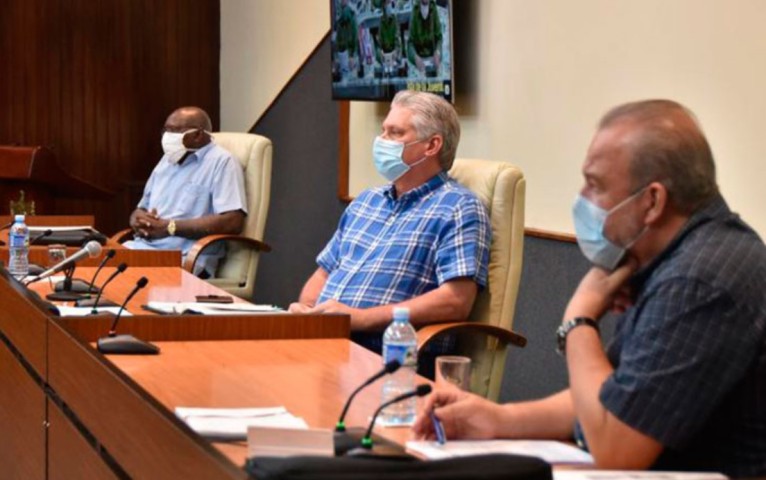
 Cubanet, Miriam Celaya, Havana, 19 July 2020 — If I had to briefly describe the general impression that emerges from the new Economic and Social Strategy of the Cuba’s upper echelons of power, I would choose three preliminary adjectives: wrong, late and incomplete.
Cubanet, Miriam Celaya, Havana, 19 July 2020 — If I had to briefly describe the general impression that emerges from the new Economic and Social Strategy of the Cuba’s upper echelons of power, I would choose three preliminary adjectives: wrong, late and incomplete.
It is wrong because it continues to estimate in a foreign currency what they call “impulse to the economic development of the country” – more noteworthy, in the “enemy’s” foreign currency which supposedly generates all the ills – and in items that are not related at all to the results of the production of the (ruined) national industry: family remittances from abroad, the eternally “potential” foreign investment capital and the eventual foreign tourism income, now disappeared.
It is late because each and every one of the proposed guidelines, such as the “flexibilities” announced for the private sector, financial “autonomy” for state-owned companies, the introduction of micro and small and medium-sized companies, among other measures could and should have been implemented many years ago, especially during the thaw period, with the administration of the then-US President, Barack Obama, when the Castro regime had its best opportunity to implement these and other changes.
On the other hand, the official proposal for economic reforms in the current national and international context (though it is noteworthy that the term “reforms” was not uttered), far from projecting an alleged interest of the power claque to expand the economic potential of citizens or a real desire for change, only evidences despair and a sense of urgency to increase hard currencies.
But perhaps the most relevant feature of this official strategy, which they now offer as the holy grail to try to revive the depressed economy, is its incompleteness. And here, it is worth dwelling on several root considerations when it comes to economic efficiency.
According to the leaders of the Castro court, the priority objective of all the theoretical-strategic scaffolding – which until now is only about that: theory and intentions – is food production. In fact, the spokesman of the constituents of the Political Bureau of the PCC, comrade Díaz-Canel, in his scolding speech before the Council of Ministers on the morning of July 16th made reference to the urgent need to achieve “food sovereignty”, a kind of religious invocation resulting from the delusions of the Deceased-in-Chief, whose status has never advanced beyond that of a chimera, and who only sounds yet again like a bad omen in the current scenario.
But, getting to the heart of the matter, producing food at a level that satisfies domestic demand, substitutes imports and even generates income from exports – as these hallucinated ones claim – necessarily goes through the everlasting problem of property relations over land, a critical point of which no mention was made on last Thursday’s Roundtable television program.
If the farmer is not the legitimate owner of the land he works; if, in addition, laws (not simple paper “strategies”) that grant legal nature and protection to the producer are not implemented; if the inopportune interventions of the State that establish price limits, criminalize commerce or impose leonine taxes are not irreversibly suspended; in short, if, simultaneously with the “flexibilities” in the economy, the corresponding civil and political rights are not recognized for citizens, there will be no effective progress, nor will the necessary and profound changes take place.
The official rhetoric, so worn and rotten that its seams seem to pop, deserves a full stop. About said rhetoric I will only mention some brushstrokes that stand out in the midst of the ideological patch that preceded the information on the masterful “Strategy”, through the intervention (in effigy) of the president by appointment, which makes clear the absence of a compass of a political power that weighs itself down as obsolete and ineffective.
When Díaz-Canel, in his parliament, reminiscent of a “Cantinflas”* movie plot, declares that “to benefit everyone, sometimes you have to take measures that seem to favor a few but in the long run favor everyone”, and when the differentiation of access to goods is established as a norm and services according to the income of citizens, privileging those who receive foreign exchange – to the detriment of the state worker who receives his salary in national currency (CUP) and the most humble sectors of society, without access to remittances or other income – and establishing the bases for a new and deeper social gap between the poor and the rich, are in fact establishing the same “neoliberal” strategies that have been so widely criticized by the seat of power when it comes to other governments in other latitudes.
But if, to add to the humiliation, the official media offers to the most disadvantaged the promise of two “additional” pounds of rice and six ounces of beans, to be distributed for two months through the ration card, then discrimination is compounded by insult.
Hopefully, all of us Cubans, here or overseas, will finally place ourselves at the height of the conflict. This time it is worth paraphrasing the maker of national ruin to tell those who humiliate and insult us from the seat of power that we don’t want them; we don’t need them.
*Translator’s note: Cantinflesco: A term derived from Mexican actor Mario Moreno Cantiflas’ movie genre: laughable, ridiculous, caricature-like.
Translated by Norma Whiting
